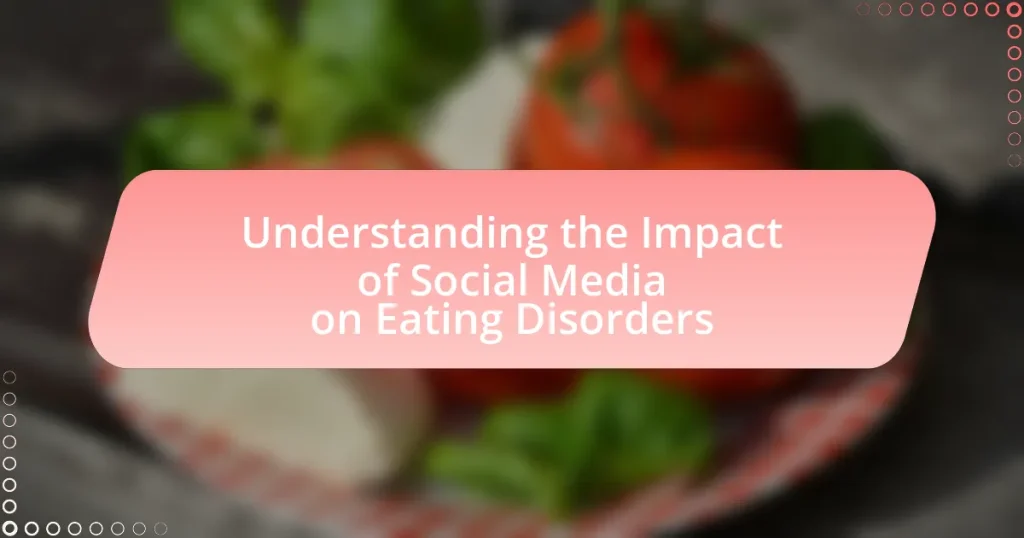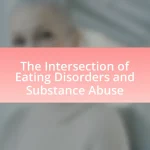The article examines the significant relationship between social media and eating disorders, highlighting how exposure to idealized body images and diet culture on these platforms can lead to body dissatisfaction and disordered eating behaviors. It discusses the influence of social media on body image perceptions, the role of likes and comments in shaping self-esteem, and the types of eating disorders most affected, including anorexia nervosa and bulimia nervosa. Additionally, the article emphasizes the psychological effects of social media on individuals with eating disorders, the importance of awareness for prevention strategies, and practical tips for cultivating a healthier relationship with social media. It also outlines the role of mental health professionals in addressing these issues and provides resources for individuals struggling with eating disorders related to social media.
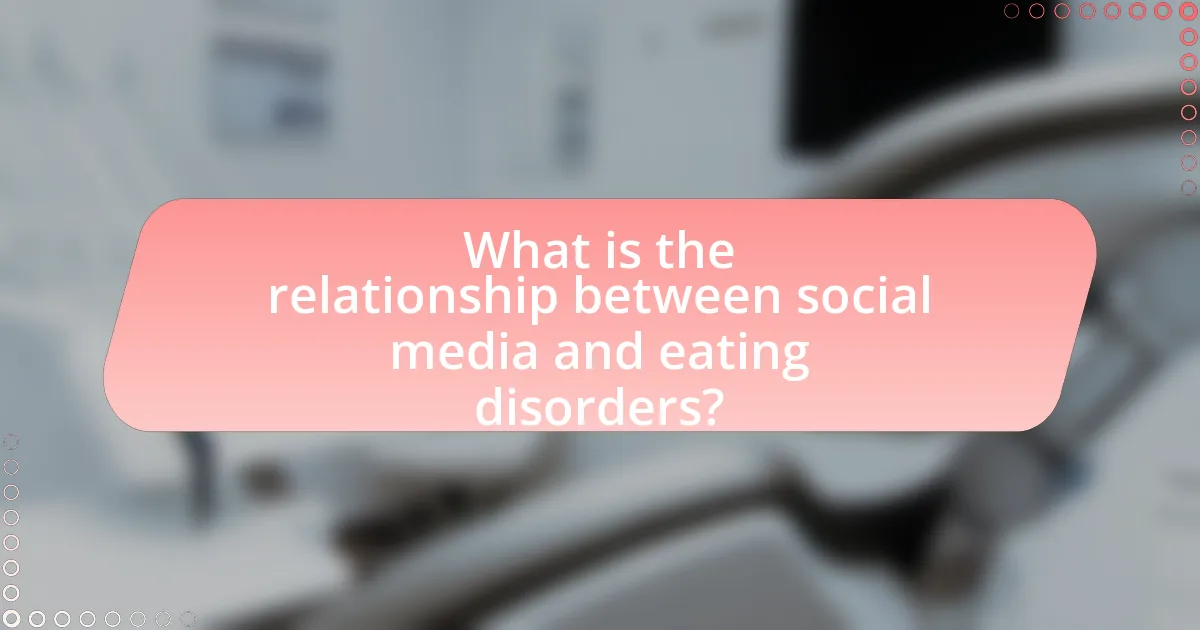
What is the relationship between social media and eating disorders?
The relationship between social media and eating disorders is significant, as exposure to idealized body images and diet culture on these platforms can contribute to the development and exacerbation of eating disorders. Research indicates that individuals who frequently engage with social media are more likely to experience body dissatisfaction, which is a known risk factor for eating disorders. A study published in the journal “Eating Disorders” found that adolescents who spent more than three hours per day on social media reported higher levels of disordered eating behaviors compared to those who spent less time online. This correlation highlights the impact of social media on self-image and mental health, reinforcing the need for awareness and intervention strategies.
How does social media influence body image perceptions?
Social media significantly influences body image perceptions by promoting idealized and often unrealistic standards of beauty. Research indicates that exposure to images of thin and fit individuals on platforms like Instagram and Facebook can lead to negative body image and increased dissatisfaction among users. A study published in the journal “Body Image” found that young women who frequently engage with appearance-focused content on social media report higher levels of body dissatisfaction and a greater likelihood of developing eating disorders. This correlation highlights how social media can shape perceptions of body image, often leading to harmful comparisons and self-esteem issues.
What role do social media platforms play in shaping beauty standards?
Social media platforms significantly influence beauty standards by promoting idealized images and lifestyles that often prioritize unrealistic body types and appearances. These platforms, such as Instagram and TikTok, utilize algorithms that amplify content featuring beauty trends, leading to widespread exposure of curated and edited images that set unattainable benchmarks for attractiveness. Research indicates that 70% of young women feel pressure to conform to these beauty ideals, which can contribute to body dissatisfaction and eating disorders. Furthermore, a study published in the journal “Body Image” found that frequent exposure to idealized images on social media correlates with increased body dissatisfaction and disordered eating behaviors among adolescents.
How do likes and comments affect self-esteem related to body image?
Likes and comments on social media significantly influence self-esteem related to body image by reinforcing societal beauty standards and creating a feedback loop of validation or criticism. Research indicates that individuals often equate the number of likes and positive comments with their self-worth, leading to increased body dissatisfaction when engagement is low. A study published in the journal “Body Image” by Fardouly et al. (2015) found that exposure to social media images and the subsequent feedback can exacerbate negative body image and lower self-esteem, particularly among young women. This correlation highlights the psychological impact of social media interactions on individuals’ perceptions of their bodies.
What types of eating disorders are most affected by social media?
The types of eating disorders most affected by social media are anorexia nervosa, bulimia nervosa, and binge eating disorder. Research indicates that social media platforms often promote unrealistic body standards and dieting behaviors, which can exacerbate these disorders. For instance, a study published in the International Journal of Eating Disorders found that exposure to pro-anorexia content on social media significantly increased the risk of developing anorexia nervosa among young women. Additionally, the prevalence of bulimia nervosa has been linked to social media’s portrayal of weight loss and ideal body images, as highlighted in a study by the University of Pennsylvania, which found that increased social media use correlates with higher rates of disordered eating behaviors.
How does social media contribute to the development of anorexia nervosa?
Social media contributes to the development of anorexia nervosa by promoting unrealistic body standards and fostering environments that encourage disordered eating behaviors. Research indicates that exposure to idealized images and content related to thinness on platforms like Instagram and Facebook can lead to increased body dissatisfaction among users, particularly adolescents. A study published in the journal “Eating Disorders” found that individuals who frequently engage with pro-anorexia content are more likely to develop symptoms of the disorder, highlighting the direct correlation between social media use and the onset of anorexia nervosa.
What impact does social media have on bulimia nervosa and binge eating disorder?
Social media significantly contributes to the development and exacerbation of bulimia nervosa and binge eating disorder. Research indicates that exposure to idealized body images and weight-related content on platforms like Instagram and Facebook can lead to increased body dissatisfaction, which is a known risk factor for these eating disorders. A study published in the journal “Eating Disorders” found that individuals who frequently engage with appearance-focused content are more likely to experience disordered eating behaviors, including binge eating and purging. This correlation highlights the detrimental role social media plays in shaping unhealthy attitudes toward food and body image.
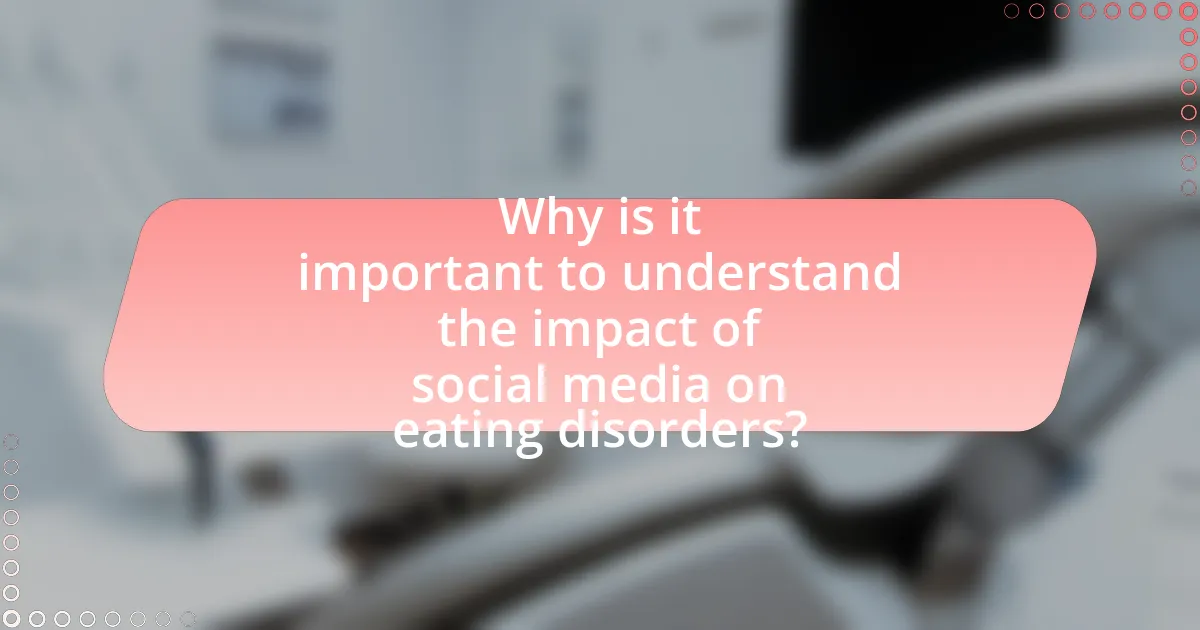
Why is it important to understand the impact of social media on eating disorders?
Understanding the impact of social media on eating disorders is crucial because social media platforms significantly influence body image perceptions and behaviors. Research indicates that exposure to idealized body images on social media can lead to increased body dissatisfaction, which is a known risk factor for developing eating disorders. For instance, a study published in the journal “Eating Disorders” found that individuals who frequently engage with appearance-focused content are more likely to experience disordered eating behaviors. This highlights the need for awareness and intervention strategies to mitigate the negative effects of social media on mental health and eating behaviors.
What are the psychological effects of social media on individuals with eating disorders?
Social media significantly exacerbates psychological issues in individuals with eating disorders by promoting unrealistic body standards and fostering negative self-image. Research indicates that exposure to idealized images on platforms like Instagram can lead to increased body dissatisfaction, which is a critical factor in the development and maintenance of eating disorders. A study published in the journal “Eating Behaviors” found that individuals with eating disorders who frequently engage with social media are more likely to experience heightened anxiety and depression, as they compare themselves to curated online personas. Furthermore, social media can create an echo chamber that reinforces disordered eating behaviors, as individuals may seek out communities that validate their unhealthy habits, further entrenching their psychological struggles.
How does social media exacerbate feelings of isolation and anxiety?
Social media exacerbates feelings of isolation and anxiety by creating unrealistic standards and fostering negative comparisons among users. Research indicates that frequent exposure to idealized images and lifestyles on platforms like Instagram can lead to feelings of inadequacy and loneliness, as individuals may perceive their own lives as inferior. A study published in the journal “Cyberpsychology, Behavior, and Social Networking” found that higher social media usage correlates with increased anxiety and depressive symptoms, particularly among adolescents. This connection is attributed to the pressure to maintain a curated online persona, which can lead to social withdrawal and heightened feelings of isolation.
What is the connection between social media use and the prevalence of eating disorders?
Social media use is significantly connected to the prevalence of eating disorders, as exposure to idealized body images and diet culture on these platforms can lead to body dissatisfaction and unhealthy eating behaviors. Research indicates that individuals who frequently engage with social media are more likely to compare themselves to others, which can exacerbate feelings of inadequacy and contribute to the development of disorders such as anorexia and bulimia. A study published in the journal “Eating Disorders” found that higher social media usage correlates with increased risk factors for eating disorders, highlighting the role of social media in shaping body image perceptions and promoting unhealthy weight control practices.
How can awareness of social media’s impact lead to better prevention strategies?
Awareness of social media’s impact can lead to better prevention strategies for eating disorders by enabling stakeholders to identify harmful content and promote healthier online environments. Research indicates that exposure to idealized body images on social media correlates with increased body dissatisfaction and disordered eating behaviors among adolescents. For instance, a study published in the journal “Body Image” found that young women who frequently engage with appearance-focused social media content are more likely to develop eating disorders. By understanding these dynamics, educators, parents, and mental health professionals can implement targeted interventions, such as media literacy programs, that teach individuals to critically evaluate social media content and its effects on self-esteem and body image. This proactive approach can mitigate the risks associated with social media use and foster a supportive community that prioritizes mental health.
What educational initiatives can help mitigate the negative effects of social media?
Educational initiatives that can help mitigate the negative effects of social media include digital literacy programs, mental health education, and social media awareness campaigns. Digital literacy programs teach individuals how to critically evaluate online content, recognize misinformation, and understand the impact of social media on mental health. For instance, research from the Pew Research Center indicates that media literacy can empower users to navigate social media more effectively, reducing susceptibility to harmful content. Mental health education in schools can provide students with coping strategies and promote body positivity, addressing issues related to self-esteem and body image that are often exacerbated by social media. Additionally, social media awareness campaigns can inform users about the potential risks associated with social media use, such as cyberbullying and unrealistic portrayals of body image, thereby fostering a more supportive online environment.
How can parents and guardians support healthy social media habits?
Parents and guardians can support healthy social media habits by actively engaging in their children’s online activities and setting clear guidelines for usage. Research indicates that parental involvement, such as discussing the content children encounter and encouraging critical thinking about social media portrayals, can significantly reduce the risk of negative body image and eating disorders. For instance, a study published in the Journal of Adolescent Health found that adolescents with supportive parents who communicated openly about social media were less likely to develop unhealthy eating behaviors. By fostering an environment of open dialogue and education regarding social media’s impact, parents and guardians can help mitigate the risks associated with social media exposure.
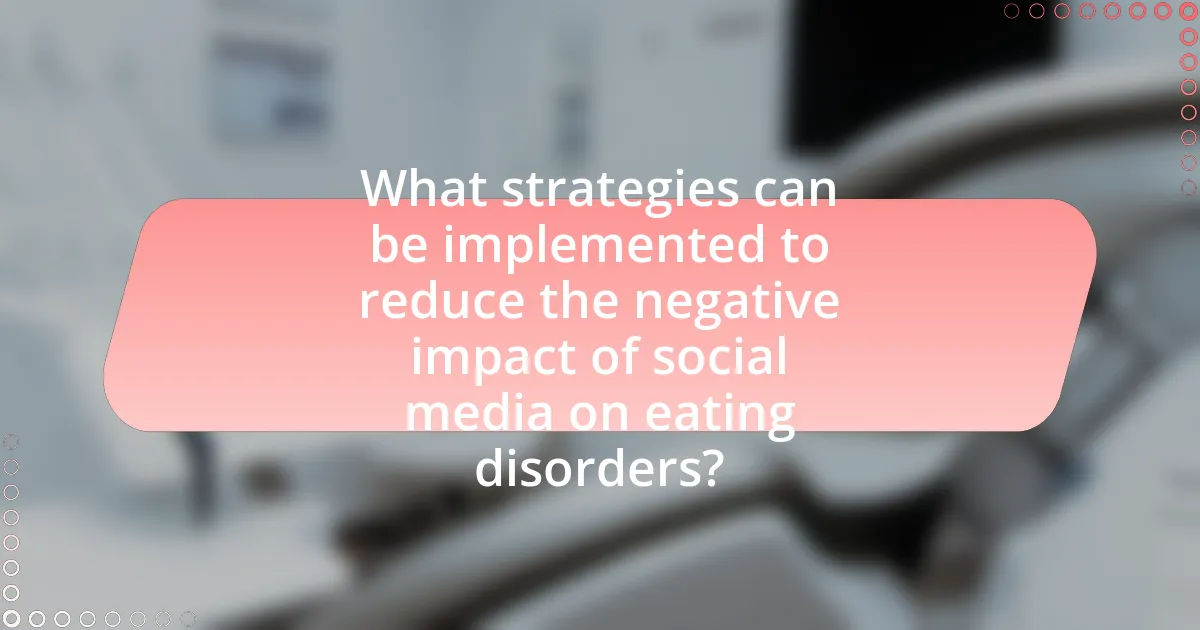
What strategies can be implemented to reduce the negative impact of social media on eating disorders?
To reduce the negative impact of social media on eating disorders, implementing media literacy programs is essential. These programs educate individuals, particularly adolescents, about the unrealistic portrayals of body image and the potential dangers of social media influence. Research indicates that media literacy can significantly decrease the internalization of thin ideals and body dissatisfaction, which are risk factors for eating disorders. For instance, a study published in the Journal of Eating Disorders found that participants who underwent media literacy training reported lower levels of body dissatisfaction and a reduced likelihood of engaging in disordered eating behaviors. Additionally, promoting positive body image campaigns on social media platforms can counteract harmful content, fostering a supportive online environment that encourages self-acceptance and diversity in body shapes and sizes.
How can individuals cultivate a healthier relationship with social media?
Individuals can cultivate a healthier relationship with social media by setting boundaries on usage and curating their feeds to include positive, uplifting content. Research indicates that excessive social media use can lead to negative body image and increased risk of eating disorders, as highlighted in a study published in the journal “Body Image” by Perloff (2014), which found a correlation between social media exposure and body dissatisfaction. By limiting time spent on platforms and following accounts that promote body positivity and mental well-being, individuals can mitigate harmful effects and foster a more supportive online environment.
What steps can be taken to unfollow harmful accounts and content?
To unfollow harmful accounts and content, individuals should first identify the accounts that promote negative body image or unhealthy behaviors. Users can then navigate to the profile of each harmful account and select the “Unfollow” option. Additionally, users can adjust their content preferences by utilizing platform features such as “mute” or “block” to limit exposure to unwanted content. Research indicates that reducing exposure to harmful social media influences can significantly improve mental health outcomes, particularly for individuals vulnerable to eating disorders.
How can mindfulness practices help in managing social media consumption?
Mindfulness practices can significantly help in managing social media consumption by promoting awareness and intentionality in users’ online behaviors. By cultivating mindfulness, individuals can develop a greater understanding of their emotional responses to social media, which can reduce compulsive checking and scrolling. Research indicates that mindfulness can decrease anxiety and improve emotional regulation, leading to healthier interactions with social media platforms. For instance, a study published in the journal “Computers in Human Behavior” found that mindfulness training reduced social media addiction and improved overall well-being among participants. This evidence supports the effectiveness of mindfulness in fostering a more balanced and conscious approach to social media use, ultimately mitigating its potential negative impacts on mental health and eating disorders.
What role do mental health professionals play in addressing social media’s influence?
Mental health professionals play a crucial role in addressing social media’s influence on eating disorders by providing assessment, intervention, and education. They help individuals recognize the negative impact of social media on body image and self-esteem, which are significant risk factors for developing eating disorders. Research indicates that exposure to idealized body images on social media can lead to increased body dissatisfaction and disordered eating behaviors. Mental health professionals utilize therapeutic techniques, such as cognitive-behavioral therapy, to challenge harmful beliefs and promote healthier self-perceptions. Additionally, they educate clients and families about the potential risks associated with social media use, fostering awareness and resilience against its adverse effects.
How can therapy incorporate discussions about social media use?
Therapy can incorporate discussions about social media use by exploring its influence on clients’ self-image and mental health. Therapists can facilitate conversations about how social media platforms contribute to body image issues, anxiety, and depression, particularly in relation to eating disorders. Research indicates that exposure to idealized images on social media can lead to negative self-perception and unhealthy behaviors, as highlighted in a study by Fardouly et al. (2015) published in the journal Body Image. By addressing these topics, therapists can help clients develop healthier relationships with social media and promote positive coping strategies.
What resources are available for individuals struggling with eating disorders related to social media?
Individuals struggling with eating disorders related to social media can access various resources, including professional therapy, support groups, and educational materials. Professional therapy, such as cognitive-behavioral therapy (CBT), has been shown to be effective in treating eating disorders, with studies indicating that CBT can lead to significant improvements in symptoms (Fairburn et al., 2015). Support groups, both online and in-person, provide community and shared experiences, which can be beneficial for recovery. Organizations like the National Eating Disorders Association (NEDA) offer helplines, online forums, and resources tailored to those affected by eating disorders. Additionally, educational materials that address the impact of social media on body image and self-esteem can help individuals understand and mitigate the negative influences of social media.
What practical tips can help individuals navigate social media positively?
To navigate social media positively, individuals should curate their feeds by following accounts that promote body positivity and mental well-being. Research indicates that exposure to positive content can reduce feelings of inadequacy and anxiety, which are often exacerbated by negative portrayals of body image on social media platforms. Additionally, setting time limits on social media usage can help mitigate the risk of comparison and negative self-talk, as studies show that excessive use correlates with increased symptoms of depression and anxiety. Engaging in mindful consumption, such as reflecting on how certain posts make one feel, can further enhance the experience, allowing individuals to unfollow accounts that trigger negative emotions.
